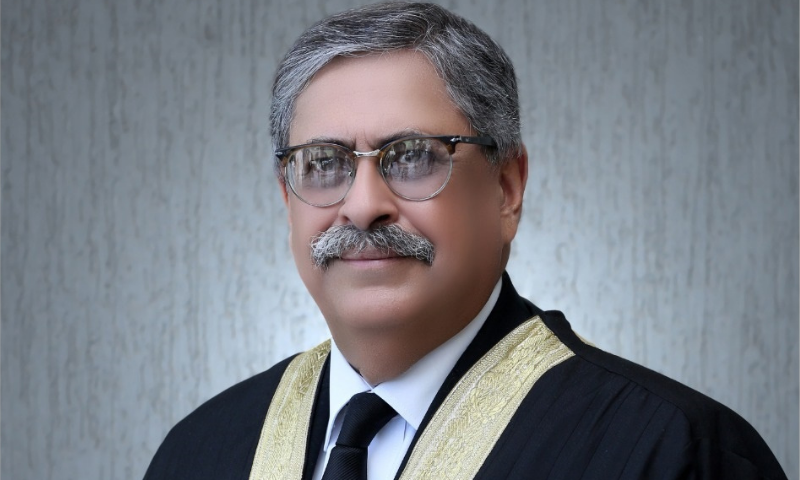ISLAMABAD (APP): Supreme Court Judge Justice Athar Minallah on Friday issued a 25-page detailed dissenting note in the sou motu notice case on Punjab elections.
Justice Minallah in the note stated that the country was on the brink of a political and constitutional crisis and it was high time that all those responsible should take a step back and resort to some introspection. “All the institutions, including this court, need to set aside their egos and strive towards fulfilling their constitutional obligations.
“Speaking for my institution, it is obvious that we may not have learnt any lessons from our past bleak history. We cannot erase the judgments from the law reports but at least endeavour to restore public trust and confidence so that the past is forgotten to some extent. When politicians do not approach the appropriate forums and bring their disputes to the courts, the former may win or lose the case, but inevitably the court is the loser.”
Justice Athar Minallah further said, “I feel it necessary to record my observations regarding the hearings. It is ironic and unimaginable for the political stakeholders to involve the court in resolving political disputes which ought to have been settled in the forums created for this purpose under the Constitution.
“It is also alarming that the conduct of the political stakeholders and their political strategies would create unprecedented political turmoil and instability in the country. Political stability is a precondition for economic progress and prosperity of the people. The power struggle between the political stakeholders is undermining the welfare and economic conditions of the people of this country.
The people of Pakistan have been made to suffer for a long time by depriving them of their fundamental rights. The long spells of undemocratic regimes validated by this court have caused irretrievable loss to the country and its people. The institutions which represent the will of the people were not allowed to take roots. Even today, seventy-five years after the creation of Pakistan the institutions remain weak.”
He stated that the manner and mode in which “these proceedings were initiated have unnecessarily exposed the court to political controversies. It has invited objections from political stakeholders in an already polarised political environment. The objections have also been submitted in writing.
This obviously has consequences for the trust the people ought to repose in the impartiality of the court. The court, by proceeding in a premature matter, will be stepping into already murky waters of the domain of politics. It is likely to erode public confidence. The assumption of suo motu jurisdiction in itself may raise concerns in the mind of an informed outside observer. In the circumstances, the rights of litigants whose cases are pending before us would be prejudiced, besides eroding public trust in the independence and impartiality of the court.
“This could have been avoided if a Full Court was to take up these cases. It would have ensured the legitimacy of the proceedings. The legitimacy of the judgment rendered in the Pakistan Peoples Party Parliamentarians case was solely based on the invocation of the suo motu jurisdiction on the recommendation of twelve judges of this court. Every judge has sworn an oath to defend, protect and preserve the Constitution. The constitution of
a Full Court, as was suggested in my note dated 23.02.2023, was imperative to preserve public trust in this court. “There is another crucial aspect which cannot be ignored; the conduct of the political stakeholders. The political climate in the country is so toxic that it is inconceivable that political parties will even agree to having a dialogue, let alone arriving at a consensus. As a political strategy, resignations en masse were tendered from the National Assembly, rather than discharging their constitutional obligations as members of the opposition.
The constitutional courts were first approached to compel the Speaker to accept the resignations and when they were accepted the courts were again approached to have the decision reversed. The dissolution of the provincial legislature as part of the political strategy of the stakeholders raises questions. Is such conduct in consonance with the scheme of constitutional democracy? Is it not in itself a violation of the Constitution? Should this court allow its forum to be exploited for advancing political strategies or appear to be encouraging undemocratic conduct? Should this court not take notice of forum shopping by political stakeholders by invoking the jurisdictions of high courts and this court simultaneously?
“This court cannot and must not appear or be seen as advancing the political strategies of political stakeholders. The public trust will be eroded in the independence and impartiality of the court if it appears or is seen to encourage undemocratic norms and values. The court would be unwittingly weakening the Majlis-e-Shoora (Parliament) and the forums created under the Constitution by encouraging political stakeholders to add their disputes to our dockets.
The political stakeholders must establish their bona fides before their petitions could be entertained. The conduct of the stakeholders has created an unprecedented political instability by resorting to conduct that is devoid of the democratic values of tolerance, dialogue and debate. The conduct of the stakeholders does not entitle them to invoke the jurisdiction of this court under Article 184(3) of the Constitution lest it is seen or appears to facilitate or promote undemocratic values and strategies.”







